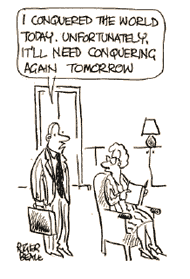Business schools should be wary of producing MBA ‘heroes’
Roula Khalaf, Editor of the FT, selects her favourite stories in this weekly newsletter.
Producing MBA graduates who aim high and are committed to making a difference is a crucial function of any business school. However, schools need to be increasingly careful to guard against the temptation to produce what we might call “heroes”.
Ken Kesey, author of One Flew Over the Cuckoo’s Nest, once remarked that the problem with heroes is what to do between phone booths. But there is another, rather more pressing difficulty: heroes are the stuff of epics – and epics are not sustainable. This is because epics invariably have an ending. King Arthur sails off to Avalon, or Ithaca is at peace once more. Once the final page has been turned, once the credits roll, it is all over. But such endings do not sit comfortably with the modern world.
In recent years the pace of change has been so rapid that the average man or woman will have seen several significant innovations rise, fall, die and in some cases be all but forgotten in stunningly short order. The gales of creative destruction, as economist Joseph Schumpeter called them, are blowing louder and faster than ever. We live in an age of ceaseless transition – one in which innovation and entrepreneurship, the ability to adapt and adjust, should have infinitely more value than a supposedly “heroic” attitude rooted in fixed goals and short-term reward.
Of course, it is important to acknowledge that aspiring business leaders may well wish to cast themselves as heroes. After all, who does not dream of wading into the fray, bucking the odds and emerging supremely victorious? Business schools should not suppress this tendency per se, since it is not without positive qualities. But they should clearly define the limits of the epic approach and their principle aim should be to prepare students for the real world.

It is vital that the schools acknowledge and teach that students – and, in time, the organisations they go on to represent – are better served if they are encouraged to see themselves more as actors in a larger story that requires them to interact with a multiplicity of possibilities. Enduring success does not lie in ploughing a lone furrow towards some manner of brave but inherently egotistical finale: it lies in harnessing the energy and intellect of the most diverse networks possible.
Business schools should make this reality abundantly plain. Sociologist Robert Holton observed that in abandoning the narrative structure of the epic one is left with the incessant drama of the soap opera. This may sound unappealing, even alarming, but the inescapable truth is that soap operas are built to last: they are capable of enormous change during their lifetimes, as a result of which many of them are long-lived and profitable.
There are entrepreneurs and inventors who fit the epic role, but most innovation is carried out with little fanfare – the long-running and dependable soap opera – and this in itself is a cause for confidence during periods of uncertainty.
There is room both for epic and soap alike in the schedules and the former may well forever enjoy a higher status in the eyes of some. But business schools and their students would do well to remember it is the latter that has the staying power.
We can never have too many innovators. Too many heroes, on the other hand, we can more than likely live without.
Paul Kirkham is a researcher in the field of entrepreneurial creativity with Nottingham University Business School
Comments